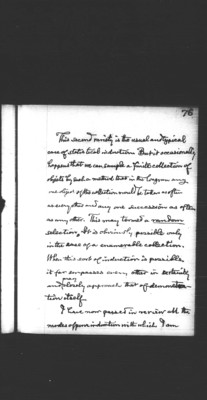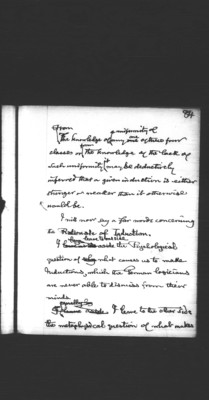Pages
41
76
This second variety is the usual and typical case of statistical induction. But it occasionally happens that we can sample a finite collection of objects by such a method that in the long run any one object of the collection would be taken as often as every other and any one succession as often as any other. This may termed a random selection. It is obviously possible only in the case of an enumerable collection. When this sort of induction is possible it far surpasses every other in certainty and may closely approach that of demonstration itself.
I have now passed in review all the modes of pure induction with which I am
42
78
acquainted. Induction may, of course, be strengthened or weakened by the addition of other modes of argument leading to the same conclusion or to a contrary conclusion. It may also be strengthened or weakened by arguments which do not directly affect the conclusion of the induction but which increase or diminish the strength of its procedure. There are in particular four kinds of uniformities which may greatly affect an induction.
In the first place the members of a class may present a greater or less general resemblance as regards certain kinds of characters. Birds for example are, generally speaking,
43
80
much more alike than are fishes or mammals; and that will strengthen any induction about birds. Orchids, on the other hand, are extraordinarily various.
In the second place a character may have a greater or less tendency to be present or absent throughout the whole of certain kinds of groups. Thus, coloration often differs within one species, while the number of the principal bones of the skeleton, and almost all characters which are developed early in individual life and which persist to maturity are common to all the members of large classes.
44
82
In the third place, a certain set of characters may be more or less intimately connected, so as probably to be present or absent together in certain kinds of objects. Thus, we generally associate insistency upon minute forms with narrowness of mind, cleanliness with godliness, and so on.
In the fourth place, an object may have more or less tendency to possess the whole of certain sets of characters when it possesses any of them. Thus, one meets one man whose views whatever they may be are extreme, while the opinions of another form a strange mosaic.
45
84
From the knowledge of a uniformity of any one of these four classes or from the knowledge of the lack of such uniformity it may be deductively inferred that a given induction is either stronger or weaker than it otherwise would be.
I will now say a few words concerning the Rationale of Induction.
I leave to one side the Psychological question of what causes us to make Inductions, which the German logicians are never able to dismiss from their minds.
I leave to the other side the metaphysical question of what makes




